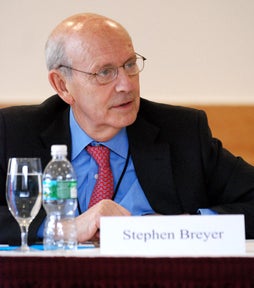
In a special seminar sponsored by the Center for History and Economics at Harvard, Associate Justice Stephen Breyer ’64 of the U.S. Supreme Court discussed his new book, “Making Our Democracy Work: A Judge’s View,” his jurisprudential philosophy, and as the origins of judicial review.
Through a series of cases since the nation’s founding, Breyer said, the Supreme Court has established its legitimate role as guardian of the Constitution.
Breyer’s thesis: While some of the Court’s decisions have, at one point or another, been disregarded, today the public consistently obeys the Supreme Court’s decisions as the law of the land.
“I heard Senator Harry Reid say something remarkable. Despite the division over the contested election, the 2000 transition was completely peaceful and there wasn’t violence in the streets,” Breyer said.
“Some of you must be thinking there should have been violence,” he quipped, “but you should see what it’s like for countries that solve their problems that way.”
Breyer said he rejects the strict constructionist/textualism practiced by his conservative colleagues and instead favors a philosophy of “prudence and prejudice” that aims “to create workable relationships between the Courts and other branches.”
While the Constitution’s core principles remain intact, Breyer argued, the circumstances and nature of American culture have evolved.
“The values that the Court encapsulates don’t change, but the world constantly represents changing conditions.”
He asked the audience, for instance, if the Constitution’s framers knew about the advent of the Internet when they created the Commerce Clause.
“We know very little history. Would you want a Constitution that simply took application of 18th century meanings?…I don’t know how good a Constitution that would be.”
Praising the efforts of former Justice Sandra Day O’Connor to engage high school students in civics education, Breyer also discussed how the Court can continue to maintain public confidence.
Breyer urged his colleagues to show more deliberately how the courts try to help Americans in their everyday lives. “Let’s not let the Court completely off the hook,” he said.
After graduating from Harvard Law School, where he was articles editor of the Law Review, Breyer clerked for Justice Arthur Goldberg during the Supreme Court’s 1964-65 term, helping Goldberg write his opinion in Griswold v. Connecticut, the landmark right-to-privacy case. Following a stint in the Justice Department’s antitrust division, he joined the faculty of Harvard Law School, where he taught full time from 1967 to 1980, with interruptions for public service. He was an assistant to Watergate special prosecutor Archibald Cox ’37 and later chief counsel to the Senate Judiciary Committee.
In 1980, President Carter appointed Breyer to a seat on the United States Court of Appeals for the 1st Circuit, where he served–including four years as chief judge–until President Clinton elevated him to the Supreme Court in 1994.
(For more on Justice Breyer, see a related story in The Harvard Crimson.)